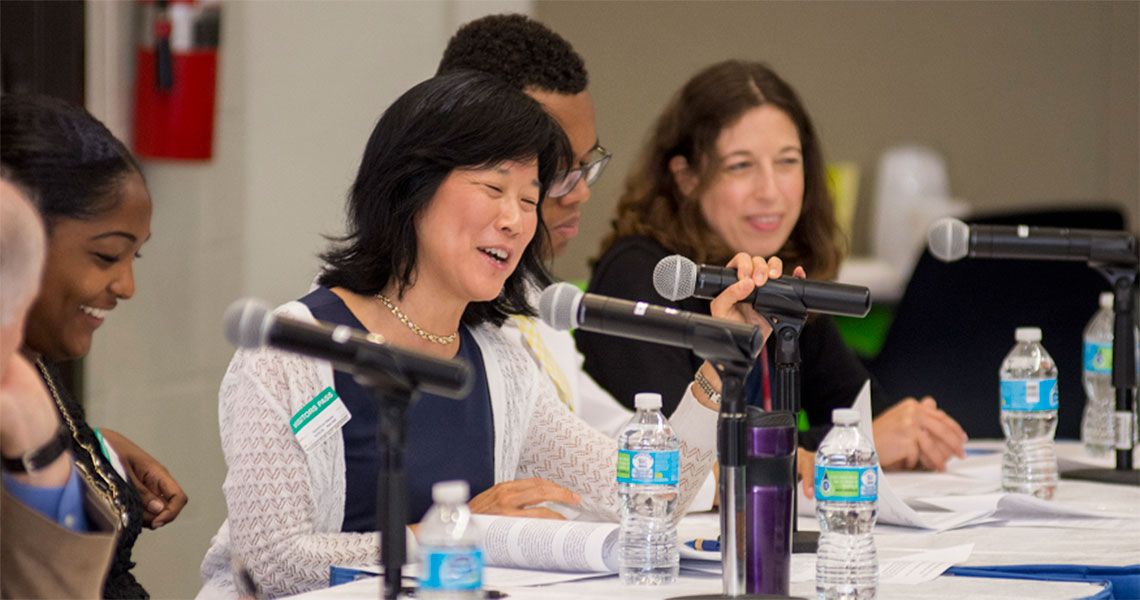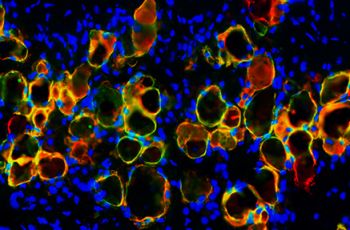“Let me tell you about ‘Robbie’,” said Kofi Essel, M.D. ’11, pediatrician at Children’s National Health System, painting a composite of obesity disease and a typical patient group in his opening remarks for the GW School of Medicine and Health Sciences (SMHS) Clinical Public Health Summit on Obesity in June. “He’s a 14-year-old diagnosed with severe obesity. He and his family have all dealt with weight issues. He has a parent whose type 2 diabetes that has progressed to the point where he or she has started experiencing a loss of eyesight.
“They’re ready to make a change as a family,” Essel added. “How do you address obesity, [especially] in children? It has to start from the top.”
Essel’s guidance, he said, extends beyond the clinic and into his patients’ kitchens, where he helps them adjust their approach to food. “I encourage them to take cooking classes; take family walks; explore the available resources in their communities,” he said.
He even makes home visits to assess their food environment, as many of the families he sees live in the city’s food deserts, where grocery stores and access to fresh fruits and vegetables are rare. “We look in the refrigerator and the freezer to make sure we can assist the families with enhancing their physical activity and access to more healthful foods and ensure they have better options than just microwave dinners,” he said.
In many cases, a few lifestyle changes can result in a consistent downward trend on weight curve. “The weight changes are not the only successes that we see in these families,” Essel explained, adding that many benefits come in the form of reduced social stigma, improved motivation to change, and prevention of overweight patients from entering into the “obesity” category. Physicians, like Essel, can play a particularly important role in helping patients adopt changes; that’s where the SMHS Clinical Public Health Summit on Obesity comes in.
The three-day summit grew out of the clinical public health series SMHS launched in 2014 with the workshop, “How Physicians Can Help Create an AIDS-Free Generation.” Since then, the course, which during the first year in medical school students giving presentations at the White House before national HIV/AIDS health care leaders, has become a fixture of the M.D. curriculum, and series topics have grown to include childhood asthma as well as obesity.
“GW students will continue to graduate as excellent clinicians, but they will practice in a health care system that is changing dramatically,” said Lawrence “Bopper” Deyton, M.D. ’85, M.S.P.H., senior associate dean for clinical public health and professor of medicine at SMHS, when the school launched the series. “In order to be successful clinicians and leaders in that changing environment, GW students must expand their scope of practice to include clinical public health. They must know how to assert their role as clinicians to improve community health. And we must teach them how to do that.”
As the Class of 2018 learned, obesity is a pervasive disease in the United States, particularly in areas where healthy food and access to care are scarce. Seventeen percent of children have obesity, as do 37.7 percent of adults. Reversing the trend in families isn’t just a matter of cutting calories; it is essential that physicians not only learn effective strategies to understand and manage obesity in the clinical setting, but also be equipped to act as agents of change in communities grappling with food deserts, health inequity, and other social determinants of obesity.
Over the course of the summit, students heard from experts in the field, participated in plenary sessions and break-out discussions, and completed site visits, all of which served as a foundation for students to develop proposals to prevent and combat obesity, both at a clinical and a community level.
From Bill Dietz, M.D., Ph.D., chair of the Sumner M. Redstone Global Center for Prevention and Wellness at the Milken Institute School of Public Health at GW (Milken Institute), who presented on “Obesity – From Clinical to Population Level,” students learned how to translate their understanding of the health effects of obesity to public policy approaches. Karla Bartholomew, Ph.D., J.D., M.P.H., PA, program officer for clinical public health and assistant professor of physician assistant studies at SMHS, followed Dietz by issuing the charge to the students and outlining the scope of the project: devising ways to mitigate obesity at the community level.
During the plenary sessions and discussions, led by representatives from local and national community organizations, teams of students looked at creative approaches, such as restructuring health systems, promoting healthy eating, and improving physical activity habits. Thought leaders on hand included Katie Adamson, director of Health Partnerships & Policy at YMCA of the USA; Loretta DiPietro, Ph.D., chair of the exercise science department at the Milken Institute; Pamela Hess, executive director at the Arcadia Center for Sustainable Food and Agriculture; Patrick McDermott, chef instructor with Common Threads; and Yolanda Savage-Narva, M.S.Ed., director for health equity with the Association of State and Territorial Health Officials.
To illustrate the effect clinicians can have in the public health arena, SMHS faculty members Babak Sarani, M.D. ’97, RESD ’04, associate professor of surgery and director of Trauma and Acute Care Surgery at GW Medical Faculty Associates, and Jonathan Reiner, M.D., professor of medicine at SMHS and director of the GW Hospital’s Cardiac Catheterization Lab, teamed up to discuss the public health causes they’ve championed; in Sarani’s care, seatbelts and car seats, while Reiner has led the push for legislation to nationalize rules for Automated External Defibrillators (AED) as well as increased legal protection for Good Samaritans who use AEDs.
Using “upstream” intervention techniques — focusing on the social determinants that contribute to obesity — small student groups developed innovative proposals to minimize those factors that promote and perpetuate obesity in children (in preschool, elementary school, middle/high school-aged children) and adults (in young adults, middle aged adults, and reproductive-age women).
For solutions to obesity in children, ideas ranged from revising educational curriculums, which would incorporate physical activity, nutrition lessons, and cooking classes, to more community- and hospital-based efforts, such as prioritizing filtered water systems and having a nutritionist available. Teams also offered bottom-up approaches to boost healthy eating habits among preschoolers, such as introducing a new fruit or vegetable each week and tracking progress using a passport to health. Students offered top-down options as well; they suggested, for example, establishing minimum structured and unstructured activity time for kids in the D.C. Head Start program.
The team looking to address obesity among young adults took a more inward approach to the problem, suggesting the answer lay in better training among medical school students. “We need to make sure that medical students learn the skills that they need to develop healthy habits in their own lives, so that they can better [educate] patients about healthy eating and physical activity,” the students wrote in their proposal, adding that expanding course content on nutrition and physical activity would also be beneficial.
Students presented their proposals and received instant feedback from panels of experts. In addition to Dietz, the review panel for obesity in children included Debbie Chang, M.P.H., senior vice president of policy and prevention at Nemours Children’s Health System; Alicia Tucker, M.D., pediatrician and obesity clinician with the Obesity Institute IDEAL Clinic at Children’s National Health System; Marcus Andrews, M.P.H., student in the Milken Institute; and Shana Bartley, director of programs with DC Action for Children. Students presented proposals for obesity in adults to Nicole Ehrhardt, M.D., assistant professor of medicine at SMHS and an endocrinologist with the GW Medical Faculty Associates; Patty Nece, J.D., counsel for regulations and legislation with the U.S. Department of Labor; and Ambrose Lane, chair of the Health Alliance Network.



